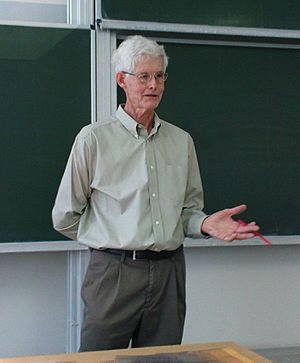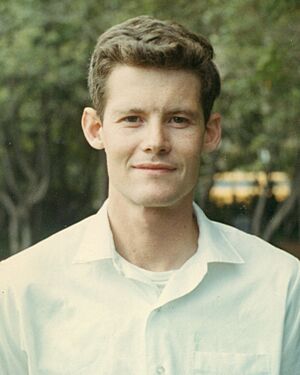Stephen Cook facts for kids
Quick facts for kids
Stephen Cook
OC OOnt
|
|
|---|---|

Cook in 2008
|
|
| Born |
Stephen Arthur Cook
December 14, 1939 Buffalo, New York
|
| Education | University of Michigan (BA) Harvard University (MA, PhD) |
| Known for | NP-completeness Propositional proof complexity Cook–Levin theorem |
| Awards |
|
| Scientific career | |
| Fields | Computer Science |
| Institutions | University of Toronto University of California, Berkeley |
| Thesis | On the Minimum Computation Time of Functions (1966) |
| Doctoral advisor | Hao Wang |
| Doctoral students | Mark Braverman Toniann Pitassi Walter Savitch Arvind Gupta Anna Lubiw |
Stephen Arthur Cook (born December 14, 1939) is an American-Canadian computer scientist and mathematician. He has made very important discoveries in how computers solve problems. He is known for his work in a field called computational complexity theory. This field studies how much time and memory computers need to solve different problems.
Cook is considered one of the most important people in computational complexity theory. He helped create many of the ideas we use today. He is now a retired professor at the University of Toronto.
Contents
Stephen Cook's Early Life and Education
Stephen Cook was born in Buffalo, New York. He loved learning about math and computers. He earned his first degree in 1961 from the University of Michigan. After that, he went to Harvard University. He received his master's degree in 1962 and his PhD in mathematics in 1966.
After finishing his studies, Cook became a professor. He taught at the University of California, Berkeley from 1966 to 1970. In 1970, he moved to Canada. He joined the University of Toronto as a professor. He became a full professor in 1975 and a special "Distinguished Professor" in 1985.
Cook's Big Ideas in Computer Science
Stephen Cook's most famous work came from his PhD studies. He looked at how complex different math problems were. In 1971, he wrote a very important paper. It was called "The Complexity of Theorem Proving Procedures."
Understanding NP-Completeness
In his paper, Cook introduced the idea of NP-completeness. This is a way to describe problems that are very hard for computers to solve quickly. He showed that a problem called the Boolean satisfiability problem (or SAT) is NP-complete. This means if you can solve SAT quickly, you can solve many other hard problems quickly too.
Another scientist, Leonid Levin, discovered this idea independently. So, it is now known as the Cook–Levin theorem.
The P vs. NP Problem
Cook's paper also brought up one of the biggest unsolved problems in computer science: the P vs. NP problem. Imagine you have a puzzle. If it's easy to check if a solution is correct, is it also easy to find that solution in the first place?
- P problems are those that computers can solve quickly.
- NP problems are those where, if someone gives you a possible answer, you can check if it's correct quickly.
The P vs. NP question asks: Is every problem that's easy to check (NP) also easy to solve (P)? Stephen Cook believes that P is not equal to NP. This means he thinks there are problems that are easy to check but very hard to solve quickly. This question is so important that it's one of the seven Millennium Prize Problems. If someone solves it, they could win a million dollars!
Why Cook's Work Matters
Cook's ideas have changed how we think about what computers can and cannot do. His work helps scientists understand the limits of computing. It guides them in finding better ways to solve difficult problems.
In 1982, Stephen Cook received the Turing Award. This is like the Nobel Prize for computer science. He won it for helping us understand how complex computations are. His 1971 paper laid the groundwork for the entire field of NP-Completeness.
Other Important Contributions
Cook continued to make many other contributions. In 1975, he introduced a way to formalize proofs using only concepts that computers can handle quickly. He also worked on "proof complexity." This field studies how long a proof needs to be for a computer to check it. He even co-authored a book on this topic.
His research also touched on other areas. These include how programming languages work, parallel computing (where computers work on many things at once), and artificial intelligence.
Awards and Recognitions
Stephen Cook has received many awards for his amazing work.
- In 1977, he received the NSERC E.W.R. Steacie Memorial Fellowship.
- He won the Turing Award in 1982.
- In 1999, he received the CRM-Fields-PIMS prize.
- He was honored with the John L. Synge Award and the Bernard Bolzano Medal in 2008.
- He is a member of important groups like the Royal Society of London and the National Academy of Sciences in the United States.
- In 2012, he won the Gerhard Herzberg Canada Gold Medal for Science and Engineering. This is the highest honor for scientists and engineers in Canada.
- The Government of Ontario appointed him to the Order of Ontario in 2013. This is the highest honor in Ontario.
- He was named an Officer of the Order of Canada in 2015.
- In 2015, he also received the BBVA Foundation Frontiers of Knowledge Award. This award recognized his role in figuring out what computers can and cannot solve efficiently.
Cook has also guided many students. He has helped 36 students earn their PhD degrees.
Stephen Cook's Family Life
Stephen Cook lives in Toronto, Canada, with his wife. They have two sons. One of his sons, Gordon Cook, is an Olympic sailor.
See also
 In Spanish: Stephen Cook para niños
In Spanish: Stephen Cook para niños
 | Audre Lorde |
 | John Berry Meachum |
 | Ferdinand Lee Barnett |


